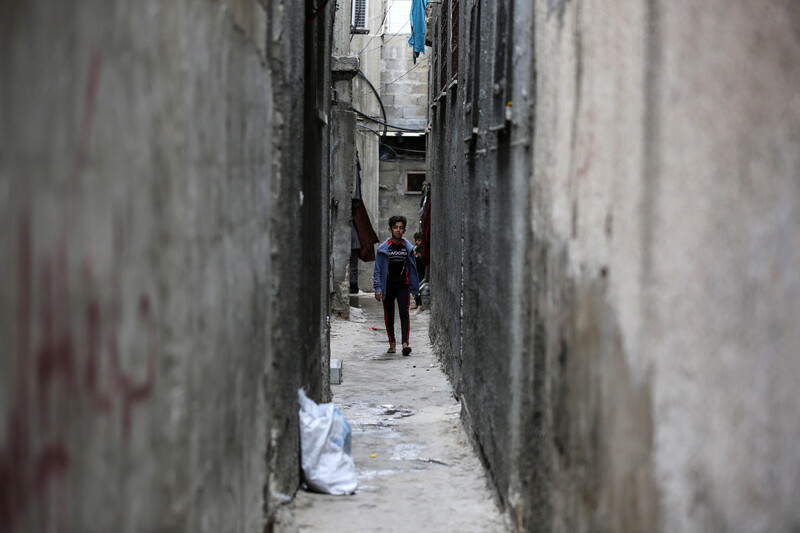16 April 2020

A Palestinian child walks between homes in Jabaliya, northern Gaza Strip, 26 March. Overcrowded housing and degraded infrastructure in much of the densely populated territory make physical distancing and other measures to prevent spread of the new coronavirus more difficult to achieve.
APA imagesPalestinians like me, living outside our country, fear that the coronavirus pandemic could be the latest nightmare to befall our loved ones back home.
As of now there are more than 12,000 confirmed cases in Israel, around 350 in the occupied West Bank and 13 in Gaza, my home.
Having grown up in Jabaliya refugee camp, I know that the types of prevention measures imposed in Europe or the United States cannot be applied in Gaza.
“Overcrowding and a lack of living space characterize Jabaliya camp,” as the UN notes. “Shelters are built in close vicinity and there is a general lack of recreational and social space.”
Big multi-generational families live under one roof. Houses are separated by shared walls or narrow alleys. Residents are within earshot of their neighbors’ conversations and privy to their daily routines.
Social or physical distancing is next to impossible.
There are 114,000 people living in Jabaliya refugee camp, but a similar situation can be found across Gaza, where 70 percent of the population are refugees.
In total, two million Palestinians live in the Gaza Strip, under a tight Israeli blockade for 13 years. Half the population are children.
Living conditions are already dire, after three major Israeli military assaults since 2008, along with the impact of the siege. Basic infrastructure and services, including electricity, education and healthcare are already far from adequate.
In 2018, the UN specifically warned of the risk of an epidemic in Gaza due to the degraded sanitation system, and the fact that 97 percent of the water supply is unfit for human consumption.
Health experts and human rights organizations are now sounding the alarm that a major outbreak of COVID-19 would be catastrophic, and have called on Israel to lift its restrictions on bringing vital supplies into the territory.
Never-ending emergency
The current crisis offers states and corporations, driven by the desire to accumulate power at the best of times, a unique opportunity to expand and consolidate their control.
Citing the coronavirus emergency, Israeli Prime Minister Benjamin Netanyahu has authorized the deployment of surveillance technology normally used for “counterterrorism.”
For Palestinians, the pandemic is not a temporary emergency but represents continuity.
The occupying power has imposed a never-ending situation of emergency that dates back to 1948, when the creation of Israel uprooted 800,000 native Palestinians from their homes.
During the Nakba, our grandparents assumed they would return in a couple of weeks. Today, we observe the birth of a fourth or fifth generation in refugee camps.
Moreover, the use of electronic surveillance by Israel to spy on and blackmail Palestinians is nothing new.
What is new here is the use of technologies tested on Palestinians against the privileged Israeli Jewish population who were previously largely shielded from such intrusion.
And while the pandemic is a boon for companies and states seeking to expand their power, it is in the short term a blessing in disguise for Netanyahu. Until a few weeks ago, he was counting his last days as prime minister and facing imminent trial on corruption charges.
But for him, the pandemic could not be more timely: a state of emergency which he can manipulate and use to maintain power.
While all focus is on the pandemic, attention is diverted from Israel’s continued military repression of Palestinians.
In March alone, Israel detained more than 350 Palestinians across the occupied West Bank and Gaza, including 48 children and four women.
Meanwhile, prisons where Israel holds some 5,000 Palestinian political detainees, are – like prisons around the world – turning into hotspots for coronavirus.
Israeli jailers and at least one released Palestinian are among confirmed cases.
At least four other Palestinians were potentially exposed to the virus during interrogation by an Israeli prison worker.
This has pushed detainees and their advocates to call for urgent international action to save them from Israel’s systematic policy of medical neglect in its prisons.
It is clear that the “emergency response” to the new coronavirus does not mean a suspension of Israel’s systems of oppression.
New normal?
In the midst of the crisis, it is hard to think ahead. There’s no doubt that many measures being applied are necessary to save lives, as perhaps a third of the world’s population is under some form of lockdown.
But decisions made in these extraordinary times could permanently shape the post-pandemic reality.
Education has gone virtual. Only essential workers are permitted to go to work, while others work remotely and untold millions have lost their jobs.
In addition to expanding surveillance via mobile phone, drones are being used to monitor streets and ordinary people are acting as informants against those they suspect of breaking the rules.
When the health emergency is over, will all this become the new normal?
Traumatic memories
Wartime metaphors are in vogue. President Donald Trump has appointed generals to prominent roles in the US government’s response to what he calls an “invisible enemy.”
France’s President Emmanuel Macron has declared that his country is “at war,” while Boris Johnson, the British prime minister, has asserted that “we must act like any wartime government.”
Maybe this language helps alert people to the severity of the threat, but such comparisons sound horrible to survivors of actual wars – including wars that these very leaders have supported or fueled.
Although many countries and companies make fortunes from the business of war, war is ugly. It destroys life and human relations. The laws and conventions that people are used to in peacetime do not apply in war zones.
This pandemic is nothing like a war.

People on balconies applaud to show respect for health workers at the frontline combating the COVID-19 pandemic in Brussels, Belgium, 14 April.
XinhuaDuring a recent Skype call with dispersed family members in Gaza and Europe, we all joyfully watched as my youngest sister, Tamam, a refugee in Brussels, rushed to her balcony to join her neighbors applauding the efforts of health workers.
This triggered traumatic memories of us huddled together in our home in Gaza, with other families who had escaped neighborhoods under heavy Israeli fire.
We sat around a battery powered radio in a blackout, the floor shaking beneath our feet, listening to explosions, houses collapsing and people dying.
Then, we were scared to even look out of the window.
Our family has been shaped by such memories, including my mother giving birth to me during a military curfew on Jabaliya camp. If you broke an Israeli curfew, you risked your life, not just a mere fine.
A chance to reflect
This pandemic is a chance for reflection for people born in safe places, who are used to taking their rights for granted.
Even under lockdown, many still have access to healthcare, housing, education and freedoms that others facing the same pandemic do not.
COVID-19 exploits and exacerbates existing inequalities, globally and within societies.
In the United States, for example, Black and Latino people are getting sick and dying in far higher proportions than white Americans.
The virus provides an opportunity to question and challenge power structures such as capitalism, colonialism and imperialism, which produce this uneven vulnerability. While some commentators have asserted that the coronavirus is a great equalizer, this is clearly not the case.
My family in Palestine hopes that this pandemic reminds people of how connected we all are.
We should learn from others who have suffered with life’s uncertainties for as long as they remember because of man-made inequalities that make some people visible as others are rendered invisible.
We should be united for each other’s welfare, not warfare. We should learn from Cuba’s model of solidarity, as it sends doctors to coronavirus-hit countries, while the US tightens sanctions and pressures countries to reject Cuba’s aid.
The virus is teaching us that we can be asymptomatic but deadly to each other, especially the vulnerable. And we are learning that as long as the virus exists anywhere, no part of the world is truly safe.
In short, caring for and helping each other is not just a value to aspire to, but a necessity for our collective survival.






Comments
Poetry and
Permalink Kevin Hadduck replied on
This article, Shahd, is beautiful and powerful. Thank you.